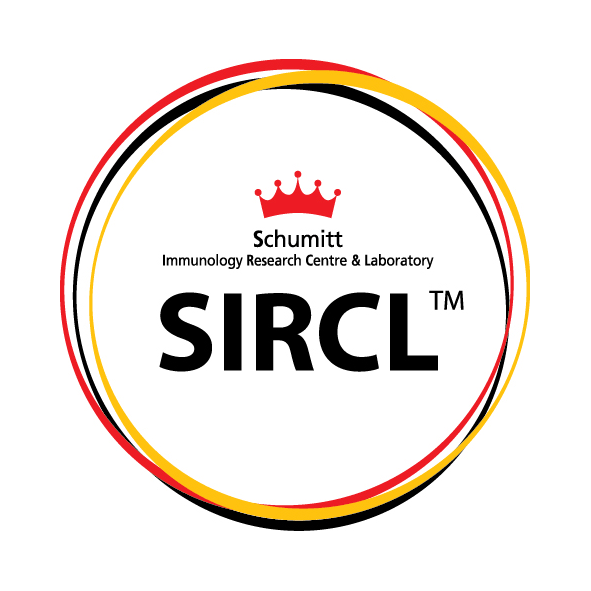

Products
/ 제품소개

이뮨젠주(싸이모신알파1) 99%
ImmungeN Injection.
: NK세포, 면역 활성화
※ 자세한 사항은 식품의약품안전처 의약품 전자민원창구
(https://ezdrug.mfds.go.kr)를 참고하세요.
[전문/일반] 전문의약품
[BIT약효분류] 기타 생물학적제제(Other Biological Agents)
[복지부분류] 429[기타의 종양치료제]
[ATC코드] Other Immunostimulants / L03AX
[주성분]
1바이알당 thymosin alpah1 1.6mg
[투여경로] 주사(피하 or 근육)
[성상]
백색 또는 거의 백색의 덩어리가 들어있는 바이알과 주사용수가 든 바이알
[포장 유통단위] 2개 세트/1카톤박스
[효능효과]
면역기능이 저하된 고령환자의 인플루엔자 백신접종시의 보조요법
[용법용량]
이 약 900ug/m2(1바이알)을 백신접종 첫 주부터 4주간 주 2회씩 피하 또는 근육 주사한다.
[저장방법 및 사용(유효)기간]
밀봉용기, 2~8도, 차광보관

Thymosin Alpha 1, Injection (thymalfasin) - USA FDA Information
DESCRIPTION
thymosin alpha 1 (thymalfasin) for subcutaneous injection is a purified sterile lyophilized preparation of chemically synthesized thymosin alpha 1 identical to human thymosin alpha 1. Thymosin alpha 1 is an acetylated polypeptide with the following sequence: Ac-Ser-Asp-Ala-Ala-Val-Asp-Thr-Ser-Ser-Glu-Ile-Thr-Thr-Lys-Asp-Leu-Lys-Glu-Lys-Lys-Glu-Val-Val-Glu-Glu-Ala-Glu-Asn-OH,and having a molecular weight of 3,108 daltons. The lyophilized preparation contains 1.6 mg thymosin alpha 1, 50 mg mannitol, and sodium phosphate buffer to adjust the pH to 6.8.
Product for Injection: Prior to administration, the lyophilized powder is to be reconstituted with 1 ml of the provided diluent (sterile water for injection). After reconstitution, the final concentration of thymalfasin is 1.6 mg/ml.
Cancer (USA FDA Indication)
thymosin alpha 1 (thymalfasin) is indicated as a adjuvant therapy for chemotherapy-induced immune depression, immune insufficiency and immune suppression in patients with non-small cell lung carcinoma (NSCLC), malignant melanoma, hepatocellular carcinoma (HCC), breast cancer, non-Hodgkin's lymphoma (CHOP program), colorectal cancer, head and neck cancer, leukemia's, pancreatic carcinoma, and renal cell carcinoma. Clinical studies in over 1,000 patients with various types of cancer demonstrated that thymosin alpha 1 improved immunological parameters increased tumor response rates, and improved survival and quality of life (see table for some of these studies) Thymosin alpha 1 was either administered for 6 months or given between chemotherapy cycles for the duration of treatment.

Chronic Hepatitis B (Korea KFDA & USA FDA Indication)
thymosin alpha 1 (thymalfasin) is indicated as a monotherapy or combination therapy with interferon for the treatment of chronic hepatitis B. Pooled analysis of 3 randomized controlled trials comprising 223 patients was performed. Thymosin alpha 1 was administered twice weekly for 6 months. Follow-up assessments were performed at 12 months after completion of treatment (see table). In multiple studies, thymalfasin was shown to have a delayed therapeutic response 12 months or longer after completion of therapy. A transient increase in ALT to more than twice baseline value (flare) can occur during thymalfasin therapy. When ALT flare occurs, thymalfasin should generally be continued unless signs and symptoms of liver failure are observed.

Chronic Hepatitis C (USA FDA Indication)
thymosin alpha 1 (thymalfasin) is indicated as a combination therapy with interferon for the treatment of chronic hepatitis C. Pooled analysis of 2 randomized controlled trials and 1 historical controlled trial comprising 121 thymalfasin plus interferon, or interferon treated patients, was performed. Thymosin alpha 1 was administered at least twice weekly for 6 to 12 months and interferon was administered up to three times weekly for 6 to 12 months. Follow-up assessments were performed upon completion of treatment and at 6 months after completion of treatment (see table).
Pooled intent-to-treat analysis demonstrated sustained bio-chemical (ALT) response, defined as normal ALT 6 to 12 months after completion of treatment, observed in 22.4% of patients treated with combination therapy compared to 9.3% with interferon alone.

DOSAGE AND ADMINISTRATION
thymalfasin is intended for subcutaneous injection and should not be given intravenously. It should be reconstituted with 1.0 ml of the diluent provided, which consists of 1.0 ml Sterile Water for Injection, immediately prior to use. At the discretion of the physician, the patient may be taught to self-administer the medication.
Chronic Hepatitis B (Korea KFDA & USA FDA Indication)
The recommend-ed dose of thymalfasin for chronic hepatitis B when used as a monotherapy or in combination with interferon (at the labeled dose and schedule for interferon) is 1.6 mg (900 µg/m2) administered subcutaneously twice a week for 6 to 12 months. Patients weighing less than 40 kg should receive a thymalfasin dose of 40 µg/kg.
Cancer (USA FDA Indication)
The recommended dose of thymalfasin for cancer is 1.6 mg (900 µg/m2) administered subcutaneous-ly using various schedules for 6 months or given between chemotherapy cycles for the duration of treatment.
HOW SUPPLIED
thymalfasin is supplied in single use vials containing 1.6 mg of lyophilized thymosin alpha 1 per vial. Each carton contains two vials of thymalfasin. Each carton also contains two ampoules of diluent for thymalfasin, each containing 1.0 ml of Sterile Water for Injection, which are to be used for reconstituting the thymalfasin.
Store thymalfasin between 2° and 8°C (36° to 46° F). Reconstituted thymalfasin should be used immediately.
REFERENCES
1. Mutchnick, M.G., Cummings, G.D., Hoofnagle, J.H., and D.A. Shafritz (1992) Thymosin: An innovative approach to the treatment of chronic hepatitis B, in Combination therapies Biological Response Modifiers in the Treatment of Cancer and Infectious Diseases, A.L Goldstein and E. Garaci, Editors. Plenum Publishing Corp: New York. p. 149-156
2. Mutchnick, M.G., Lindsay, K.L., Schiff, E.R., Cummings, G.D., and H.D. Appelman (1995) Thymosin alpha 1 treatment of chronic hepatitis B: a multicenter, randomized, placebo-controlled double blind study Gastroenterology 108(4): p. A1127
3. Lee, S.-D., D.-S. Chen, and Y.-F. Liaw (1997) Multicenter Study of Thymosin Alpha 1 in the Treatment of Chronic Hepatitis B. Data on file.
4. Chien, R.-N., Liaw Y.-F., Chen, T.-C, Yeh, C.-T., and I.-S. Sheen (1998) Efficacy of Thymosin α1 in Patients with Chronic Hepatitis B: A Randomized, Controlled TrialHepatology 27 (5) May 1998: p.1383-1387.
5. Niedzwiecki, D., Luo, D., Finn, D.S., Whiting, G.W., Connelly, J.E., Kumashiro, M., Allen, I.E. and S.D. Ross (1997) The efficacy of thymosin alpha 1 in chronic hepatitis B: a meta-analysis, Data on file.
6. Sherman, K.E., Sjogren, M., Greager, R.L. Damiano, M.A., Freeman, S., Lewey, S. Davis, D., Root, S., Weber, F.L., Ishak K.G., and Z.D. Goodman (1998) Combination Therapy with Thymosin alpha 1 and Interferon for the Treatment of Chronic Hepatitis C Infection: A Randomized, Placebo-Controlled Double-Blind Trial, Hepatology 27 (4): p. 1128-1135
7. Rasi, G., DiVirgilio, D., Mutchnick, M.G., Colella, F, Sinibaldi-Vallebona, P., Pierimarchi, P. Balli, B., and E. Garaci (1996) Combination thymosin α1 and lymphoblastoid interferon treatment in chronic hepatitis C, Gut 39: p. 679-683.
8. Moscarella, S ., Buzzelli, G., Monti M., Giannini, C, Careccia, G. Marrochi, E.M., Romanelli, R.G. and A.L. Zignego (1997) Treatment with interferon-alpha and thymosin alpha 1 of naive patients affected by chronic hepatitis C, in 4th International meeting on Hepatitis C Virus and Related Viruses. Kyoto, Japan
9. Sherman, K.E., and S.N. Sherman (1997) Pooled analysis of interferon + thymosin alpha-1 efficacy for the treatment of chronic hepatitis C. Second International Conference on Therapies for Viral Hepatitis, Kona, Big Island Hawaii, December 15-19: abstract #P50
10. Stefanini, G.F., et al., Alpha-1 thymosin and transcatheter arterial chemoembolization in hepatocellular carcinoma patients: a preliminary experience Hepatogastroenterology, 1988. 45 (19): p.209-215
11. Schulof, R.S., et al., A randomized trial to evaluate the immunorestorative properties of synthetic thymosin alpha 1 in patients with lung cancer. Journal of Biological Response Modifiers 1985 4: p. 147-158
12. Salvati, F, et al., Combined treatment with thymosin alpha 1 and low dose interferon-alpha after ifosfamide in non-small cell lung cancer: a phase II controlled trial. Anticancer Research 1996 16: p. 1001-1004
13. Rasi, G., Terzoli, E., lzzo, F., et al., Combined treatment with thymosin alpha 1 and low dose nterferon alpha after dacarbazine in advanced melanoma. Melanoma Research 2000 10: p 189-192
CLINICAL PHARMACOLOGY
Preclinical Pharmacology : The mechanism of action of thymalfasin is not completely understood but is thought to be related to its immunomodulating activities, centered primarily around augmentation of T-cell function. In various in vitro assays, thymosin alpha 1 has been shown to promote T-cell differentiation and maturation; for example, CD4+, CD8+, and CD3+ cells have all been shown to be increased. Thymosin alpha 1 has also been shown to increase production of IFN-γ, IL-2, IL-3, and expression of IL-2 receptor following activation by mitogens or antigens, increase NK cell activity, increase production of migratory inhibitory factor (MIF), and increase antibody response to T-cell dependent antigens. Thymosin alpha 1 has also been shown to antagonize dexamethasone-induced apoptosis of thymocytes in vitro. In vivo administration of thymosin alpha 1 to animals immunosuppressed by chemotherapy, tumor burden, or irradiation showed that thymosin alpha 1 protects against cytotoxic damage to bone marrow, tumor progression and opportunistic infections, thereby increasing survival time and number of survivors. Many of the in vitro and in vivo effects of thymosin alpha 1 have been interpreted as influences on either differentiation of pluripotent stem cells to thymocytes or activation of thymocytes into activated T-cells.
Pharmacokinetics
The pharmacokinetics of thymosin alpha 1 were studied in adult volunteers at single subcutaneous doses ranging from 0.8 to 6.4 mg and in multiple dose studies of 5 to 7 days duration at subcutaneous doses ranging from 1.6 to 16 mg. Thymosin alpha 1 was rapidly absorbed with peak serum levels achieved at approximately 2 hours. A dose proportional increase was seen in serum levels for C max and AUC, and serum levels returned to basal levels by 24 hours after administration. The serum half-life was approximately 2 hours and there was no evidence of accumulation following multiple subcutaneous doses. Urine excretion ranged from 31% to 60% of the administered dose following single and multiple doses.
PATIENT INFORMATION
Patients receiving thymalfasin treatment should be directed in its use and informed of the benefits and risks associated with treatment. If home use is prescribed, a puncture-resistant container for the disposal of used syringes and needles should be supplied to the patient. Patients should be thoroughly instructed in the importance of proper disposal and cautioned against any reuse of syringes or needles. Patients should be instructed to store thymalfasin refrigerated between 2°and 8°C (36° to 46° F). Reconstituted thymalfasin should be used immediately
